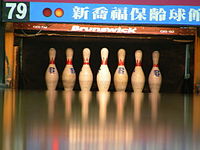Bowling pin
Bowling pins are the target of the bowling ball in various bowling games including tenpins, five-pins, duckpins, and candlepins.

Ten-pin bowling pin
Pin specifications are set by the United States Bowling Congress. World Bowling, formerly World Tenpin Bowling Association has adopted the USBC specifications. Pins are 4.75 inches wide at their widest point and 15 inches (380 mm) tall. They weigh 3 pounds 6 ounces (1.5 kilograms), pins weighing up to 3 lb 10 oz (1.6 kg) are approved. The weight of the pins were originally based on the principle of physics, with the idea that a pin should be at around 24-percent the weight of the heaviest bowling ball within regulation of 16 lb 0 oz (7.3 kg).
Duckpins
Duckpins are shorter and squatter than standard tenpins. Canadian fivepins are between duckpins and tenpins in size, but have a thick, inch-wide rubber band around the widest part of the pin to increase pin action when struck.
Candlepins
Candlepins are dissimilar to the others, being the tallest of all at 15-3/4 inches, but only 2-15/16 inches wide and 2 lb 8 oz (1.1 kg) in weight. They are nearly cylindrical in shape with a slight taper toward either end, making them vaguely resemble candles(hence the name). Unlike other bowling pins, because they are vertically symmetrical candlepins may be set on either end.
Pin construction
Bowling pins are constructed by gluing blocks of rock maple wood into the approximate shape, and then turning on a lathe. After the lathe shapes the pin, it is coated with a plastic material, painted, and covered with a glossy finish. Because of the scarcity of suitable wood, bowling pins can be made from approved synthetics. Currently there are synthetic pins sanctioned for play in five-pin, duckpin, and candlepin. There is one synthetic ten pin model approved by the USBC. When hit by the ball, synthetic pins usually sound different from wooden pins.
Juggling clubs could be mistaken for bowling pins due to their similar shape. The two differ greatly in construction and weight.
See also
- Bowling pin shooting
- Ten-pin bowling
- Nine-pin bowling
- Candlepin bowling
- Duckpin bowling
- Five-pin bowling
